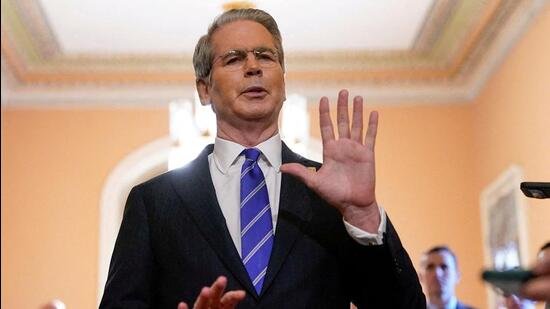President Donald Trump is not just trying to end the vicious war in Ukraine.
He’s claiming he’s already ended almost one war for each month of his second term — spanning the Middle East; Africa; and Central, South and Southeast Asia.
“I’ve done six wars — I’ve ended six wars,” Trump said in his meeting with Ukrainian President Volodymyr Zelensky and European leaders on Monday. “Look, India-Pakistan, we’re talking about big places, you just take a look at some of these wars. You go to Africa and take a look at them.”
The White House proclaimed in a statement this month that “President Trump is the President of Peace,” listing claimed diplomatic agreements between Armenia and Azerbaijan; Cambodia and Thailand; Israel and Iran; Rwanda and the Democratic Republic of the Congo; Egypt and Ethiopia; and Serbia and Kosovo, as well as the Abraham Accords, a normalization pact signed in Trump’s first term between Israel and some Arab states.
Some of this is classic Trumpian hyperbole. And the president’s team is scanning the globe looking for fires to extinguish to claim quick wins for his transparent campaign for a Nobel Peace Prize.
Trump hasn’t suddenly reinvented American foreign policy. Every administration works to halt wars and to advance US interests. Most don’t take constant victory laps — indeed, such triumphalism can often destroy quiet diplomacy.
Yet Trump has saved lives. In some cases, he’s used presidential power in novel ways to stop sudden conflicts from escalating into full-scale wars.
But his success raises new questions that also apply to Ukraine. Is Trump in it for the long haul or just for deals he can hype, much as he licensed products as a businessman and stamped his name on them?
And will Trump’s evisceration of the US Agency for International Development and downsizing of the State Department deprive him of the tools the US needs to turn breakthroughs into lasting peace agreements that solve underlying causes of wars?

Trump kept insisting Monday — as he tried finesse his adoption of Russia’s opposition to an immediate Ukraine ceasefire — that he was more interested in final deals.
Ironically however, some of his “six wars” deals are closer to ceasefires than peace agreements that permanently end generational disputes. And in the case of Iran and Israel, Trump’s claims to have made peace after their 12-day conflict are complicated by US involvement in strikes against Tehran’s nuclear program. While an informal truce is in place, there’s no sign a slow-boiling state of war involving all three nations since Iran’s Islamic Revolution in 1979 will end.
Trump is also conveniently forgetting his failed attempt to end the war between Israel and Hamas. And global outrage over reports of widespread starvation in Gaza and the president’s staunch support for Israeli Prime Minister Benjamin Netanyahu could thwart his hopes for a Nobel Prize — whatever happens with Ukraine.

His record is also blotted by the failure of his first-term peace efforts with North Korea. Leader Kim Jong Un now has more nuclear weapons than before Trump offered him fruitless, photo-op summits.
Some of Trump’s biggest successes have been behind the scenes.
“I’m struck by the fact that the ones that were helpful, especially India-Pakistan, were conducted in a professional way, quietly, diplomatically … laying the ground and finding common ground between the parties,” said Celeste Wallander, a former assistant secretary of defense who is now with the Center for a New American Security.
The most recent triumph was a joint peace declaration signed by Armenia and Azerbaijan on their long-running conflict in the Caucasus.
The agreement, inked at a lavish White House ceremony, commits the two former Soviet republics to recognizing each other’s borders and to renouncing violence against the other. But complex negotiations loom on knotty constitutional and territorial issues before a full peace agreement.
This deal is notable for two things — the way foreign states flatter Trump to get what they want, and an imperialistic streak in much of his peacemaking. The rivals, for instance, agreed to open a transportation corridor to which the US will have full development rights and to call it the “Trump Route for Peace and Prosperity.”

Azerbaijan President Ilham Aliyev declared, “President Trump, in six months, did a miracle.”
This is smart deal for the US as it counters the influence of rival powers Russia and Iran in the region. But it will need Trump’s constant attention. “Wishes and verbal declarations are not enough,” two former US ambassadors to Azerbaijan, Robert Cekuta and Richard Morningstar, wrote in a recent Atlantic Council commentary. They called on Trump to deploy officials from the State Department, the Commerce Department and other agencies to lock in the agreement.
Another of Trump’s recent triumphs came in Southeast Asia, where he threatened to shelve trade deals with both Thailand and Cambodia to halt a border war last month that killed at least 38 people. The leverage pressed home in calls to leaders of each country was effective, and it might not have occurred to another president. But Trump didn’t work alone. The agreement was brokered by the Association of Southeast Asian Nations. Cambodian Prime Minister Hun Manet knew the drill, however. He nominated Trump for the Nobel Prize for “extraordinary statesmanship.”
Pakistan took a similar step, as part of a successful diplomatic offensive to win over Trump and to disadvantage its nuclear-armed rival India after the president intervened in a border clash in May. But the government of Indian Prime Minister Narendra Modi, an erstwhile Trump buddy, dismissed Washington’s claims of a pivotal role. And other states, including Saudi Arabia, Turkey and Britain, were also involved. Trump’s claims to have ended a war are selective. The agreement is fragile and doesn’t solve the territorial dispute that sparked the fighting — over the Himalayan region of Kashmir, which has caused three full-scale wars.

Trump has proclaimed a “glorious triumph for the cause of peace” in a deal brokered between Rwanda and the Democratic Republic of Congo. This contains important first steps on recognizing borders, renouncing war and disarming militia groups. However, no one expects the conflict to end soon, since the main Rwanda-backed M23 rebel group has rejected the agreement. Some analysts see the initiative, also brokered by Qatar, as a US attempt to secure mineral rights as part of an African “great game” against China.
Trump’s claim to have brokered peace between Egypt and Ethiopia is a stretch. He’s referring to a dispute over a Nile dam in the latter nation that Egypt fears will reduce the flow in its share of the key strategic waterway. He has called for a deal over the dam, but no binding agreement has been reached.
The White House claims on Serbia and Kosovo originate in Trump’s first term, when the rivals agreed to economic normalization steps. But they still don’t have diplomatic relations, 17 years after Kosovo declared independence from Serbia. And recent normalization efforts have involved the EU more than the Trump team.
In many ways, Trump’s claims to have ended six wars are typical of a presidency that claims massive wins that often add up to less than what they seem. But there are real achievements in his record, and the possibility of genuine long-term breakthroughs if Trump can maintain application and patience.
That’s a good lesson for his nascent Ukraine peace drive.





